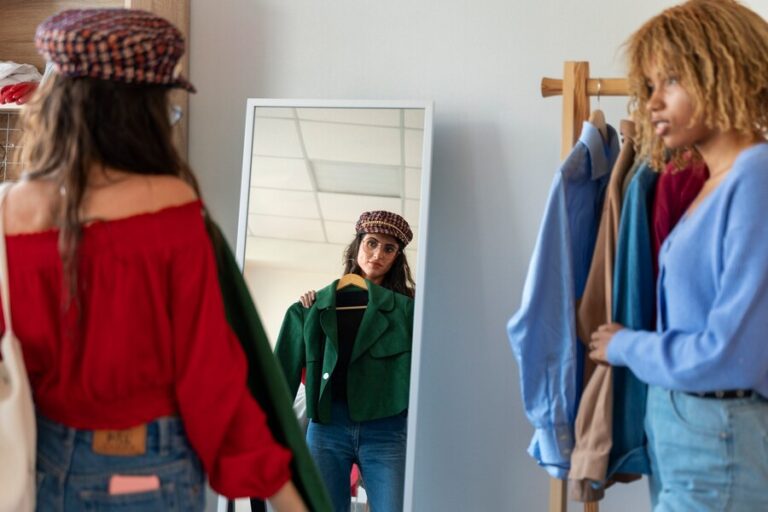Fashion is more than just fabric and trends; it’s a powerful form of self-expression that influences how we perceive ourselves and how others perceive us. Our clothing choices can profoundly affect our mental health, shaping our mood, confidence levels, and even how we navigate challenges like depression, anxiety, and self-esteem issues. Let’s explore the intricate relationship between fashion and mental well-being, and how mindful choices can promote positive outcomes.
The Emotional Armor of Fashion
Clothing serves as more than mere protection from the elements—it acts as emotional armor, shaping our self-perception and influencing our interactions with the world. When we dress in a way that aligns with our personal style and makes us feel confident, we create a positive feedback loop: our mood improves, and we project a sense of self-assuredness to others.
For individuals struggling with depression, choosing clothing that feels comfortable and expressive can provide a sense of control and empowerment. It allows them to reclaim agency over their appearance and mood, potentially alleviating some symptoms of sadness or lethargy. In contrast, neglecting personal grooming and wearing disheveled clothing may exacerbate feelings of low self-worth, reinforcing negative thought patterns associated with depression.
Similarly, for those managing anxiety, wearing clothing that feels comfortable and familiar can reduce stress levels and promote relaxation. On the other hand, overly restrictive or uncomfortable attire may heighten feelings of discomfort and exacerbate anxiety symptoms. By prioritizing comfort and personal preference, individuals can create a calming environment that supports their mental well-being.
The Impact of Social Perception
Fashion also plays a crucial role in how we are perceived by others, which can influence our self-esteem and social interactions. When we dress in a way that reflects our authentic selves and aligns with societal norms, we often feel more accepted and confident. This positive reinforcement can boost self-esteem and contribute to a sense of belonging.
Conversely, feeling out of place or uncomfortable in our clothing choices can lead to self-consciousness and diminished self-esteem. This is particularly relevant for individuals struggling with body image issues or insecurities. By selecting clothing that fits well and flatters our unique body shapes, we can foster a more positive self-image and cultivate self-acceptance.
Expression of Identity
Fashion serves as a powerful tool for self-expression, allowing individuals to communicate aspects of their identity, personality, and values without saying a word. Whether through bold colors, eclectic patterns, or minimalist designs, our clothing choices send signals about who we are and how we wish to be perceived.
For individuals exploring their identity or undergoing personal growth, experimenting with different styles can be a transformative experience. It allows them to discover new facets of themselves and express their evolving sense of identity. This process of self-discovery through fashion can be empowering and affirming, bolstering self-confidence and resilience.
The Role of Mindful Consumption
In an era of fast fashion and trends that change at lightning speed, it’s important to consider the impact of our clothing choices on both mental well-being and the environment. Mindful consumption involves making deliberate choices that prioritize quality, sustainability, and ethical practices.
Choosing to support brands that align with our values can enhance our sense of connection to our clothing and reduce feelings of guilt or remorse associated with impulse purchases. By investing in timeless pieces that withstand trends and reflect our personal style, we cultivate a more intentional and fulfilling relationship with fashion.
Empowerment Through Choice
Ultimately, the relationship between fashion and mental health underscores the power of choice. By consciously selecting clothing that makes us feel comfortable, confident, and authentic, we can harness fashion as a tool for self-care and self-expression. Whether facing challenges like depression, anxiety, or self-esteem issues, our clothing choices can serve as a source of empowerment and positivity.
As we navigate the complexities of modern life, let us recognize the transformative potential of fashion in promoting mental well-being. By embracing our individuality and honoring our personal preferences, we can create a wardrobe that not only reflects our unique identities but also supports our journey towards holistic health and happiness.
In conclusion, the psychology of fashion highlights the profound impact of clothing choices on our mental health. From boosting confidence and self-esteem to fostering self-expression and empowerment, our fashion decisions play a significant role in shaping our emotional well-being. By cultivating a mindful and intentional approach to fashion, we can harness its transformative power and embrace a more positive relationship with ourselves and the world around us.


